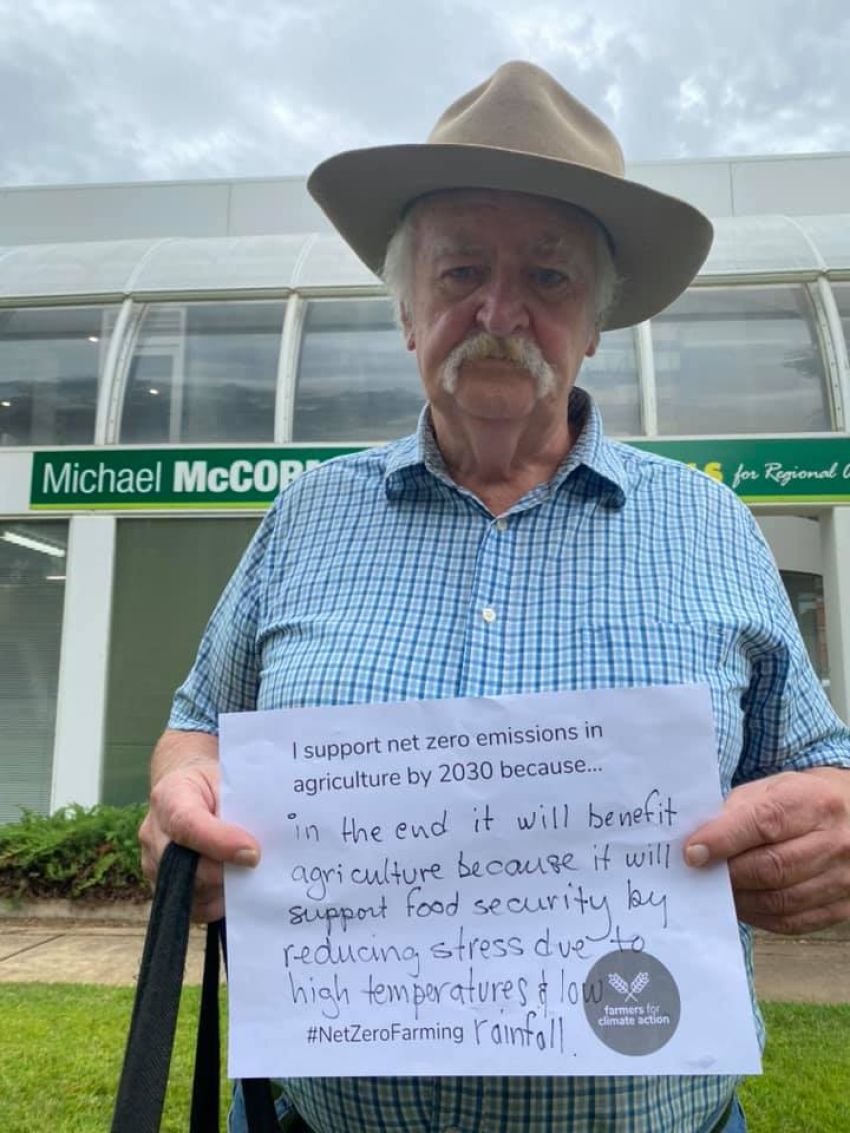
The leaders of the National Party are pressuring the federal government to exclude agriculture from greenhouse gas reduction targets, claiming farmers would be hurt financially if they were required to take action to reduce emissions.
This is not the opinion of many farmers.
Farmers are more impacted by climate change than other sections of the community. They are the victims of increased drought severity and frequency, more frequent and fiercer bushfires, damaging storms, late frosts that destroy grain crops and excessive heat that cooks fruit on the tree and vine.
Farmers know they have to increase resilience to survive the extremes.
They know the way to increase resilience also takes carbon out of the air and puts it in the soil — a gain for farmers, the environment and it slows the global temperature rise.
Many farmers are already taking action. Farmers for Climate Action (FCA), which only formed in 2015, already has 5000 farmer members and 22,000 supporters.
FCA states “if we organise farmers, graziers and agriculturalists to lead climate solutions on-farm and advocate together, we can influence our sector and the government to implement climate policies that reduce pollution and benefit rural communities”.
Its response to the Nationals’ campaign is to organise one of its own to push force the government to move on a net zero emissions target.
“It seems Mr McCormack’s missed all of the 2030 emissions targets that the various agricultural sectors have been making AND the National Farmers’ Federation’s 2050 economy-wide target.
“Australian agriculture — and the economy more broadly — stands to benefit from the transition to a low carbon economy. And we can’t afford the price of inaction.”
It is calling on famers to take selfies (preferably, on their farm) and send the Prime Minister and Deputy Prime Minister a letter stating that they support for a strong emissions target that includes agriculture with the hashtag #NetZeroFarming.
FCA spokesperson Charlie Prell said on February 13: “The Nationals’ opposition to climate action has put the party at odds with the very people they are meant to represent”.
Including agricultural emissions in Australia’s climate change obligations would stimulate the uptake of regenerative farming practices. It would also increase the pressure on government to allocate funds to enable farmers to make changes that reduce emissions and increase soil carbon sequestration.
While farmers who do make changes have done so very successfully with no government support, informal networks do not reach everyone.
Farmers need education and research into regenerative methods, and assistance which is independent from fertiliser and pesticide suppliers.
Since the government closed its support services, most farmers take get their advice from private consultants linked to agricultural-input companies, few of which have any understanding, or interest in, the changes farmers need to make in a climate-challenged world.
Farmers also need more financial support to better care for the land, including for fencing for rotational cell grazing and water points.
Soil carbon sequestration increases water holding and water infiltration. It holds nutrients. It improves soil structure. This is the key to resilience in the face of climate extremes.
Long-term soil carbon sequestration is facilitated by livestock. Rotationally-grazed grasslands have the highest soil carbon levels; livestock need to be reintroduced into cropping systems for the same purpose and to replace high-emission artificial nitrogen fertilisers.
Emissions accounting systems include ruminant methane as a major pollutant. Proper accounting should only include net emissions from livestock — the tremendous contributions well-managed ruminants make to carbon sequestration should be deducted from the carbon dioxide equivalent of methane.
Protecting soil carbon depends on year-round ground cover and minimum use of synthetic chemical fertilisers and pesticides. Bare soil loses carbon.
Ploughing and soluble nitrate fertilisers burn it up. Less than 50% of applied nitrate fertilisers are used by the crop — the remainder leach into the water table or volatise as nitrous oxide, which is a very serious greenhouse gas.
Caring for our living soil and water needs government support.
Instead of the government pushing farmers to “get big or get out” — forcing them to use high-emission management practices to pay the extra bills — a universal basic income would allow farmers and their communities to continue to care for their land even during climate disasters that remove their sources of income.
This is particularly important now as the pandemic has ended much of the tourism income that has kept many communities viable and the backpackers that have supplied farm labour.
The National Party's mantra that there is no alternative to high-input greenhouse-gas-producing farming methods does farmers no favours.
Alternative methods are well-established and used by thousands of farmers — and they are the people who are better able to withstand the impacts of climate change.
[Alan Broughton is an agro-ecologist and Elena Garcia is a regenerative grazier.]